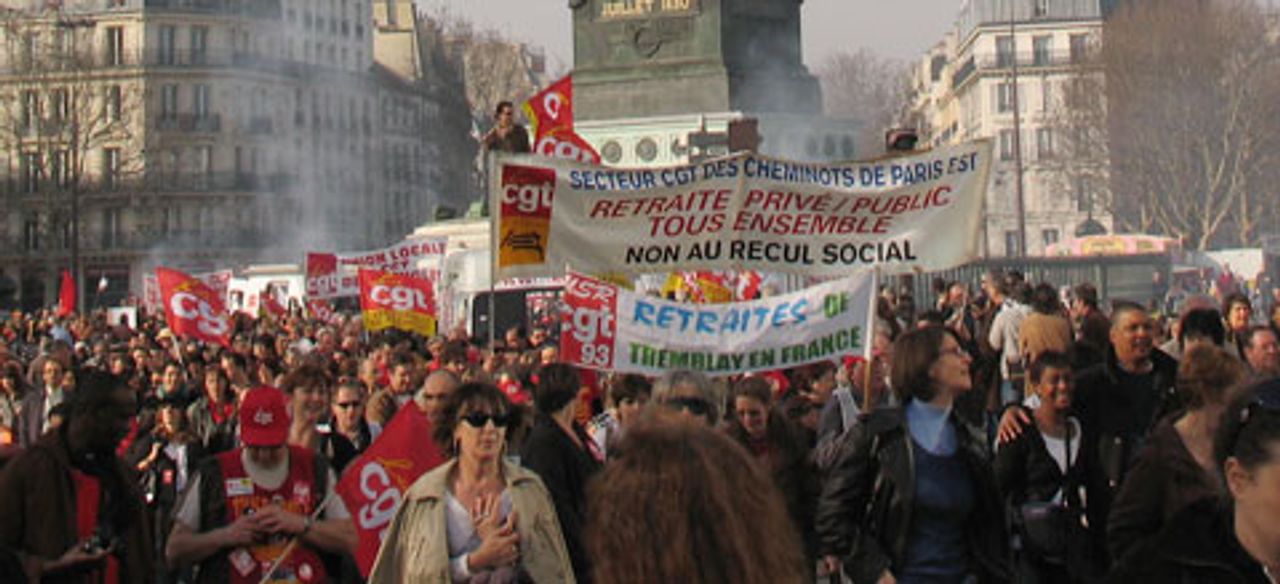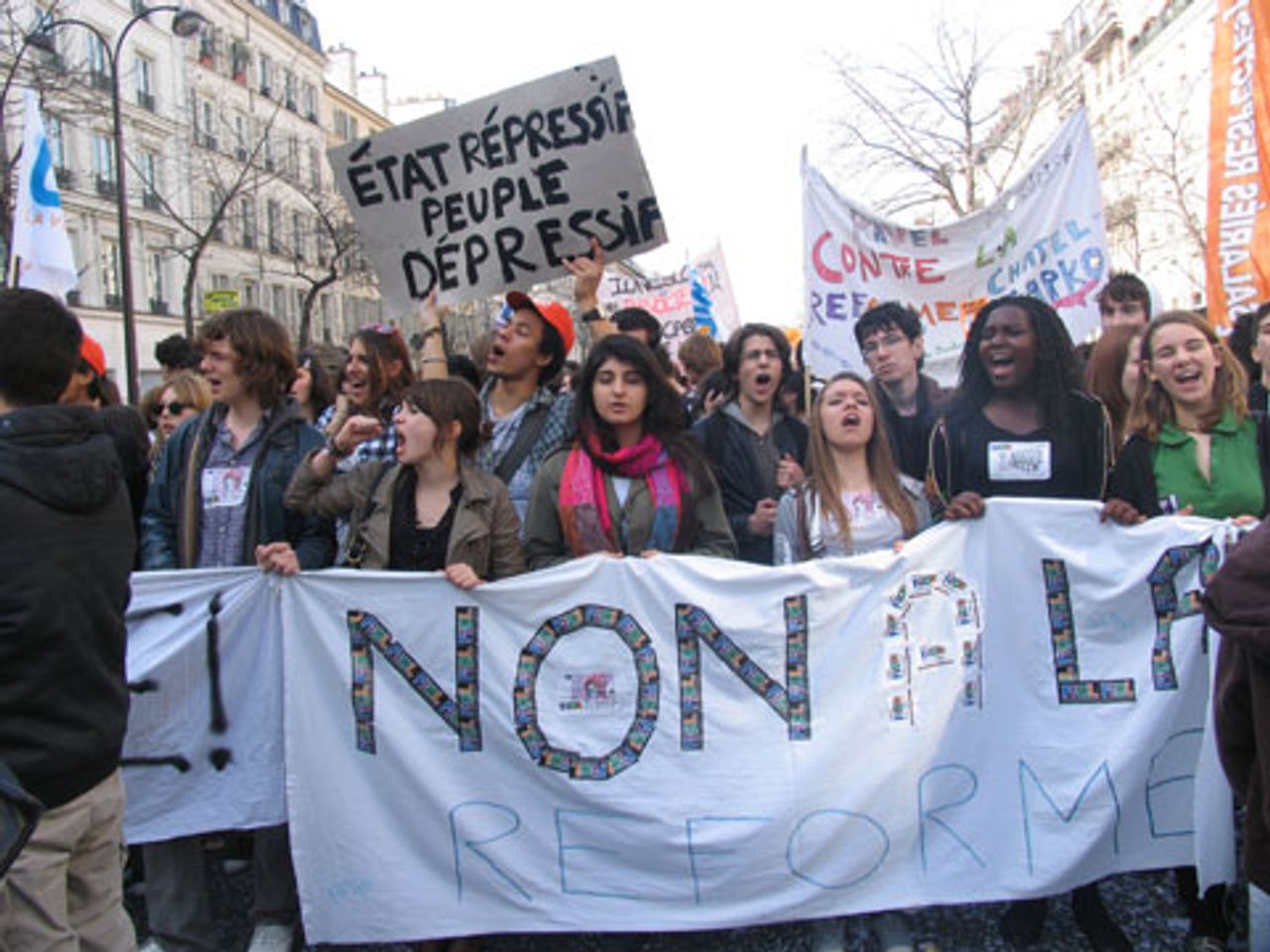Two days after French President Nicolas Sarkozy’s UMP (Union for a Popular Movement) had suffered a landslide defeat in the regional elections, over a million French public service and government employees struck yesterday against the government’s austerity plans. Many private sector workers also walked out.
 Place de la Bastille: Banner reads: Pensions - public and private all together - No to social regression
Place de la Bastille: Banner reads: Pensions - public and private all together - No to social regressionBetween 600,000 and 800,000 workers and youth participated in 177 demonstrations throughout the country. In Paris banners called for united action “for jobs, wages, working conditions and pensions.”
According to the national rail company SNCF, 28.3 percent of staff were on strike. Despite the minimum service regulations imposed in 2007, some 50 percent of normal trains and 35 percent of TGV express trains did not run.
Paris’ urban transport was little affected except for a major regional transit line, the RER B, which was operating at 50 percent. Outside the capital, the towns most affected by public transport strikes included Cannes, Clermont-Ferrand, Morlaix, Nice, Pau and Lille.
Teacher unions estimated that over half of primary teachers, and about 40 percent of secondary school teachers walked out. Many primary schools were shut for the day. Many high school and university students also walked out of classes against education cuts and reductions in educational provision.
The civil service ministry reported that 17.4 percent of its employees were on strike. The tax and treasury staff and employees in the judiciary service were on strike against “the deterioration of working conditions linked to lack of staff,” and the increase of their workload.
Postal workers were out in opposition to “profound restructuring in all departments,” “job cuts” and “increased stress.” Workers at France Telecom, which has been devastated by stress-related suicides, also struck. Farmers and energy workers were also on strike. Industrial action shut down the ballet Siddharta by Preljocaj at the Opéra Bastille.
Demonstrations included contingents from many different sectors: teachers and maintenance staff, students and parents of pupils, hospital workers, municipal employees, shop workers, firemen, court employees, sans papiers (undocumented workers) and many factory and service workers from the private sector facing closures and sackings.
 Students: Placard reads: The state represses - the people are depressed. The banner reads: No to the reform
Students: Placard reads: The state represses - the people are depressed. The banner reads: No to the reformThey carried banners and placards saying: “It’s not for the workers to pay for the speculators’ crisis,” “Schools are not a business, children are not commodities,” “Health is not a commodity,” “Mass meeting of schools in struggle: 60,000 teaching posts cut, training massacred, public education in danger of death,” “End inequality,” “Their crisis and their billions is our blood, sweat and tears.”
In Paris between 30,000 and 60,000 marched. In Bordeaux the demonstration of some 20,000 stretched over three kilometres according to union figures, in Toulouse there were between 9,000 and 18,000 on the streets. The Marseille demonstration—50,000 by union estimates—included Lipton tea workers, on the third day of their strike. Trade unions estimated there were 25,000 marchers in Nantes, 15,000 marchers in Rouen, 17,000 marchers in Caen, and 30,000 marchers in Le Mans.
Like Sunday’s regional elections, these strikes demonstrated above all the gulf separating workers’ social demands from the political establishment’s commitment to austerity measures. The government has made it clear that it has no intention of abandoning its plans, designed to reduce state expenditure by €100 billion by 2013.
Prime Minister François Fillon told the press yesterday that “the reduction of deficits...is an absolute priority.” He added: “That means that we will continue to hold down state expenditure, the General Revision of Public Policy and that we will continue with the non-replacement of one out of two retiring government workers.”
Yesterday, newspapers reported government plans for a further increase in the mandatory pay-in period for pensions, from 41 to 43.5 years. Newly-appointed Labour Minister Eric Woerth announced he would proceed with plans for cuts, cynically claiming they would be “marked with the sign of equity.”
This day of action, which was an “agreeable surprise” according to trade union bureaucrats, is part of a wave of limited strikes and protests which the unions have been calling and then cutting off in order to contain rising anger amongst workers and youth at being made to pay for the financial crisis. Meanwhile, the unions constantly discuss with employers and governments on how to impose austerity measures, without provoking a social explosion.
The day of action was called after a “social summit” of the unions with Sarkozy at the Elysée Palace on February 16. This was an opportunity for unions and the government to discuss budget-cutting proposals to slash the deficit, largely incurred through the bailout of the banks.
CGT leader Bernard Thibault called yesterday for another “social summit with the President.” He effectively called for an end to strike action, saying that further action “will depend on how the government conceives the meetings, the agendas and the coming reforms.”
